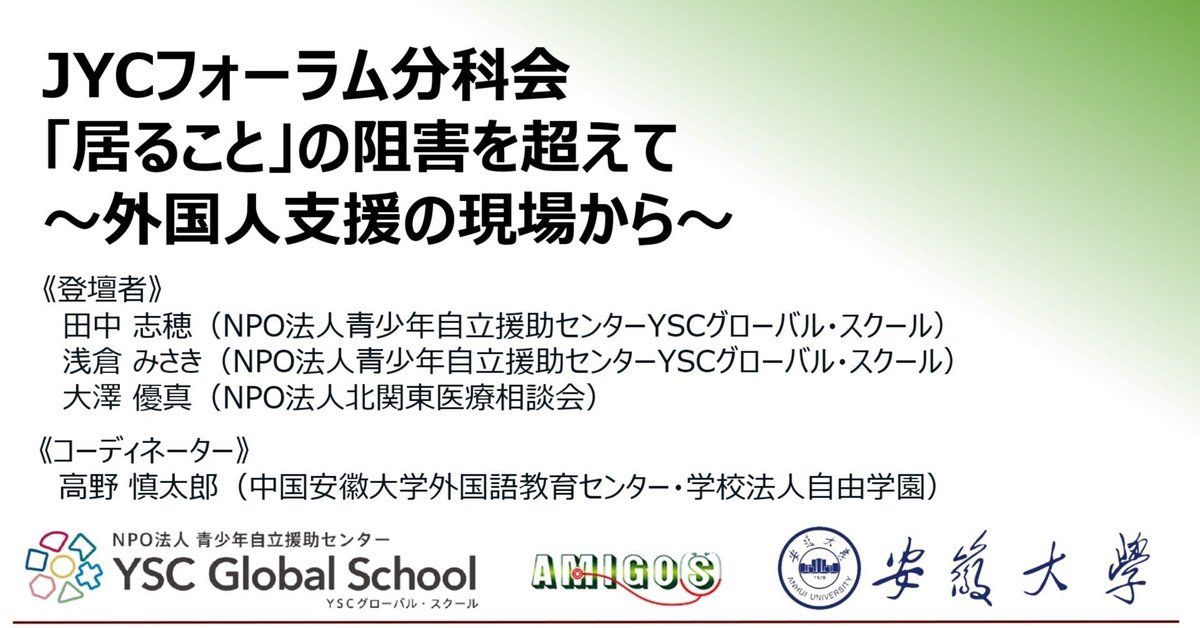
開催報告⑵ 「居ること」の阻害を超えて~外国人支援の現場から~(英語版)
2023年2月18日(土)、東京経済大学にて、「第17回全国若者・ひきこもり協同実践交流会in東京三多摩」が開催され、分科会「『居ること』の阻害を超えて~外国人支援の現場から~」が行われました。
当日は、30名を超える参加者の方々にお越し頂きました。とくに、大学生、高校生の参加が多かったのが、印象的でした。
本記事では、複数回にわたって、当日の模様をお伝えます。執筆は、上智大学の大学一年生、橋本果奈さんです。
分科会のテーマの特性をふまえ、この問題を広く知っていただくために、英語版と日本語版の2つを準備しました。日本語版も、追って公開しますので、ご期待ください。
The next speaker was a blonde fashionable young female from YSC Global School and minc, Asakura Misaki. She explained how the rates of children and youths holding nationalities outside of Japan not attending schools and receiving education are predominantly high, with estimates of around 14,137 students. Reasons differ, such as language barriers creating an even higher hurdle for individuals to be forced to overcome, problem within the education system/policies, and mental health problems triggered by many factors including micro-aggression. “When learning something new, it is especially hard for individuals who are learning it also in a new language. Even though they’re unfamiliar with the given topic already, they must get over the hurdle of changing that into their native language and make efforts to understand it fully.” is how Miss Asakura described a learning process for youths who are having to adjust to Japan and the education here. Not only do they have to face the constant discrimination, feeling of isolation, confusion with identity, and myriads of other stress inducing circumstances, they are required to put in double the amount of effort a normal japanese student must endure to achieve the same level of educational accomplishment. wducational opportunities should be persecuted with equality, however that is not the case for these youths. When it is evident that they are put in a situation where the same amount of effort does not bring the same results, the system for higher education procedures must match to the realities to ensure fairness of admission. Japan is currently very behind with implementation of policies to aid such a situation, says Miss Asakura. As a result, in 2021, 51% of students with such backgrounds did not/ could not upgrade to university, 13.5% of them being unemployed. In order to tackle this issue, YSC (Miss Asakura’s association) creates online learning platforms for students who are unable to access education through the public education system of japan, since it is their goal to distinguish isolation and encourage linkage beyond local communities and field of knowledge. She feels that more representation of individuals with nationalities and native tongue other than Japan must be spread, for Japan to become a society safe for everybody involved.
It was also a major honor to have Mr. Osawa Yuma, a social worker associated with つくろい東京ファンド and a well knowned activist in the field of refugees, immigrants, provisional release, gift us with his personal knowledge through hands on experience and interactions in the field. He starts off by explaining that for a foreigner to live in Japan, they must hold some sort of legal permit, like a work visa, tourism visa, and so on. Currently, 1 in 50 people in japan are foreigners who own a 在留資格, and there are 58000 individuals in Japan who are living in Japan without a 在留資格. “Aren’t they breaking the law? Why won’t they go back?” may be some questions a few readers may think. To that, it is through Mr Osawa’s speech that uncovered the dooming realities for 6000 individuals in Japan. They are called karihomen (仮放免).
この記事が気に入ったらサポートをしてみませんか?
